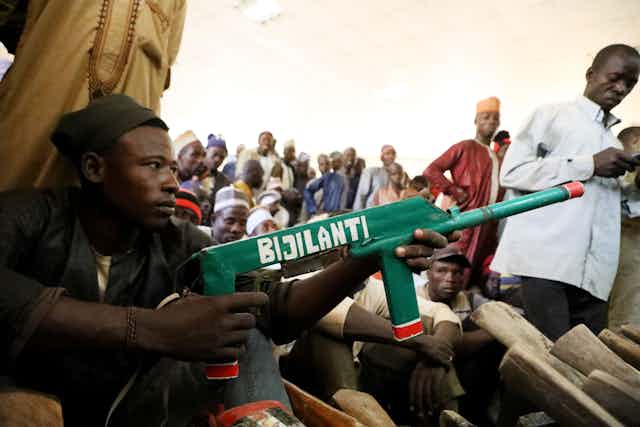Worsening crime and violence in sub-Saharan Africa is placing increasing demands on police in the region.
Six Sub-Saharan African countries are among the 20 nations with the highest crime rates in the world. They are South Sudan, South Africa, Nigeria, Kenya and Libya.
The increasing crime is associated with social factors such as income inequality, youthful population, rapid rates of urbanisation, poorly resourced criminal justice systems and the proliferation of firearms.
Particularly in Nigeria, police are typically under-resourced, inadequately trained and unaccountable, leaving them ineffective in addressing crime and security challenges.
Nonetheless, while state police are almost invariably weak, Nigerian citizens are not without policing services. Vigilantism appears to be a response to ambivalence and discontent about the authority of the state.
The vigilantism movement in Nigeria has a long history. In the Yoruba-speaking south-west, crime fighting has been led by the O'odua People’s Congress; in the eastern states by the Bakassi Boys; and across the north by Shari‘a implementation committees or Hisba.
There are two ways of seeing vigilantism. One is to see it as community-self-help policing groups that protect the public through the law enforcement style of policing. The other way is to see it as the killing of one or more people by groups of citizens without government authority. This is violent vigilantism.
My study focused on vigilantism in the first sense, as non-state policing. Because some Nigerian states have regulated it through legislation, vigilantes have a degree of authority and power. I wanted to know how the public reacted to this and whether it made communities safer.
Overall, I found that public support for and satisfaction with vigilantism or non-state police is influenced by policing strategies that build legitimacy. If the state had clear standards and supervision for this kind of policing, it could be a more effective way of countering crime.
Development of vigilantism
Africa has seen many kinds of vigilantes over time. They include white farmers in the 1910s and the 1920s in South Africa, organisations opposed to thieves and witches in Bugisu district in Uganda in the 1960s, and movements against cattle raiding in Tanzania in the 1980s and 1990s.
There were also state sponsored groups fighting anti-apartheid activists in the 1980s in South Africa, political militia with an ethnocentric and strong religious agenda such as the Mungiki in Nairobi, and the Nigerian vigilante groups already mentioned.
All these groups have been involved in neighbourhood crime control and many excesses have been reported. Some have brutally punished or killed crime suspects.
Aside from human rights abuses, vigilantes may be unreliable, poorly skilled, and lacking both transparency and accountability.
On the other hand, in Nigeria there has been an innovative approach to vigilantism.
State response
Some Nigerian states have responded to the growth of vigilantism — that is, the law enforcement style – by enacting legislation to regulate it.
For instance, in 2016, the Lagos State House of Assembly passed a law to establish the Lagos State Neighborhood Safety Agency. It regulates and controls vigilante activities.
The law was intended to ensure that emerging serious crimes did not take root in Lagos State. The new agency integrated the existing personnel of the vigilante groups if they had competence and integrity.
The neighbourhood corps are uniformed and operating within all local government areas. Its formal policing functions are to protect communities, maintain law and order, respond to emergencies, cooperate with law enforcement personnel and share information.
What residents said
My study involved a sample of 386 residents of Lagos who responded to questionnaires. These were household representatives who had some (formal or informal) contacts with vigilantes. About 42% of the sample said they were very satisfied while some 46% said they were effective.
I found that moral judgements about responsibility may be an important element of public support for policing.
Residents’ concerns were not so much about effectiveness in controlling crime and disorder. Instead, their reactions were associated with their basic social values. Vigilantes received community support provided they used procedural justice in dealing with the public.
Procedural justice refers to the idea of fairness in criminal justice processes. It means processes are fair, actions are transparent, people have a chance to be heard, and decisions are made impartially.
Respondents who perceived vigilantes as using procedural justice also viewed them as legitimate, and were satisfied with their activities and services.
The study results suggest that if procedural justice were to be used in dealing with the public, support for and satisfaction with vigilantes could become widespread in the society.
In other words, all social categories – male and female, old and young, educated and illiterate, ethnic minority and majority, rich and poor – would show similar levels of support and satisfaction.
Way forward
What is more, this voluntary support, based on the use of procedural justice, would make the agencies more effective.
Vigilantes need to acknowledge the basic dignity and rights of citizens, to account for decisions that affect them, and to make their decisions in a neutral and objective way. Brutal and violent methods of dealing with offenders should be avoided.
These findings suggest that the government should devise performance guidelines and supervisory mechanisms for vigilantism or non-state institutions wherever they exist.
They need an overarching framework of policing standards to guide performance, procedures, jurisdictions, interventions and other regular activities. The Lagos State Neighborhood Safety Agency enabling law appears to have done this. Other states where vigilantes exist may need to enact similar laws.
An accreditation programme that acknowledges demonstrable knowledge and skills of non-state actors would also be beneficial. It could offer a degree of legitimacy to the non-state actors and opportunities to monitor and improve their performance.

